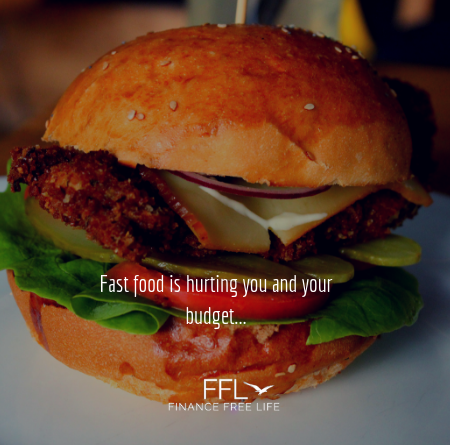Why Fast Food is Bad for You & Your Wallet
In today’s society, fast food is a convenient alternative to the traditional family dinner. It provides ease of access, as well as fast options to feed many people. It avoids the planning of cooking and the hassle of clean-up. All-in-all, fast food is very convenient! But it’s not always the best choice, both for health and financing.
Health Concerns
By eating fast food regularly, many different health concerns may become a factor. Issues such as headaches, fatigue, acne, high blood pressure or stroke, high cholesterol and even weight gain. When a habit of eating out is maintained, all of these health factors become an issue. A little bit of fast food is not an issue. When it becomes a regular habit, however, is where more significant problems arise.
Fast food meals are typically higher in fats, sugars, and salt. It is because of this composition they are considered to be more unhealthy. Studies have shown that high consumption of these meals leads to over lack of satiety in hunger. In other words, eating fast food meals frequently causes people to feel hungrier, faster. With lowered levels of satiety, people will tend to eat more meals. This, in turn, causes over-indulgence, leading to weight gain.
Weight gain is just one of the many health factors as a consequence of fast food. Listed below are several other consequences to fast food consumption.
- Headaches
- Depression
- Acne
- Decreased enamel
- heart disease or stroke risk
- Shortness of breath
- Insulin resistance
- Bloating or puffiness
- High blood pressure
- High cholesterol
- Blood sugar spikes
Financial Concerns
Another big factor in eating out regularly is the cost to eat out. When Stuart and I, a family of two, eat out it can range anywhere from $12-$25 per visit for fast food. If it is a family-style restaurant it may be more. This is a once-a-week excursion in our household. Imagine if we used it more frequently, at an average of $20 per meal. Even at $20 a meal, 2 meals a week for a month, it would cost easily $300+ for the month. At $300 per month, 12 months out of the year, we’d be looking at an average of nearly $4000 per year.
Twice a week for 52 weeks, a year, is a conservative estimate, and even still ends up costing over $4000 for the entire year. This is not sustainable long-term.
Alternatives
Feeding a family doesn’t have to be expensive. There are money saving tips to help decrease the overall budget and alternatives to constant fast-food visits.
- Meal Planning: instead of eating out for multiple meals a week, try meal planning. This requires a plan for the week of what meals to eat when, and what groceries are required to cook those meals. Rather than multiple trips throughout the week for meals, the plan is set up to ensure dinner is already available.
- Cook at home: this means for all three meals of the day. By cooking or preparing a homemade meal, you can save a significant of money. It also provides ways to feed in bulk. You can feed 3 people with one meal. Typically, this costs less than the cost to feed one person eating out!
- Pricey swaps: swap out high-priced items for cheaper one. Proteins are a big one! Looking for cheaper alternatives to the product is definitely a better option financially.
Overall, food is a large component of any family budget. Saving money in this area will require a significant time commitment, and planning, to lower the groceries budget. But it is certainly possible!
Which of the above tips stood out to you the most, or do you want to implement? Which is your favorite to use currently? Let us know in the comments below.

